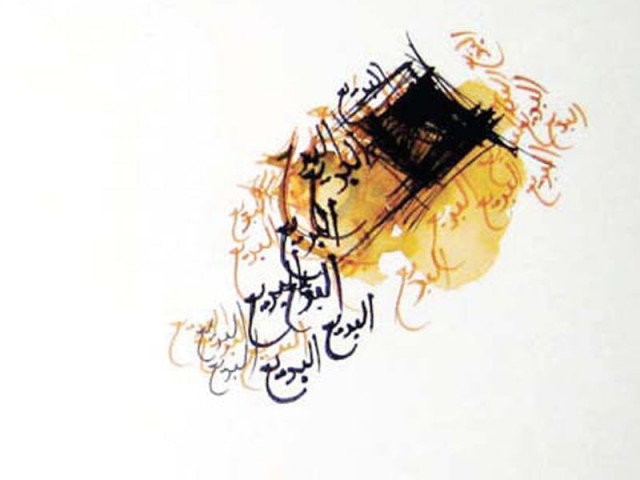Expanding the Arc : From the clot of blood to ‘Iqra’, one artist paints to read
Haya Sehgal tries to prove that acquiring knowledge, and learning from the process of growth, make us who we are.

Expanding the Arc : From the clot of blood to ‘Iqra’, one artist paints to read
An arc is, by definition, ‘a continuous portion of a circle’. As we grow, the ‘arc’ of our personalities grows inevitably. Beliefs change and mistakes turn into lessons learned. Contemporary artist Haya Sehgal’s show ‘Expanding the Arc’ focuses on just that. She traces the spiritual journey of man in a circle of enlightenment from a ‘Nukta’ — a clot of blood — and then back again to the beginning.
Her exhibition was set up at the VM Art Gallery and opened on May 10. Though many of the pieces were sold on opening night, her work will remain up till May 25. The prices start at Rs11,000 and go up to Rs40,000.
“I can only describe my work as humble strokes of devotion,” says Sehgal. “My inspiration comes from the Holy Quran and the attributes of the names of Allah.”
Her work is about a journey of self-development and learning, her inspiration is the Islamic holy book and the Arabic language. The pieces weave back and forth between personal discoveries about herself, the universe and the parallels she can draw to her religion.
Sehgal is a contemporary artist with a degree in Visual Communications from the Maryland Institute College of Art, US. She worked as a graphic designer in the creative department of a marketing agency in New York for several years before moving back to Pakistan. Though she has hosted a number of group shows and has had her work displayed in a solo exhibition in Abu Dhabi, this is her first solo show in Pakistan. The pieces, all sequential, evolve much along the same lines as the Islamic religion did. They begin with a dot and one of the attributes of God, ‘Al Badi’ meaning The Originator and travel through ‘Iqra’, Arabic for ‘read’. Islamic history states Iqra was the first word of the Holy Quran revealed to the Holy Prophet (pbuh). Quranic stories, such as that of Yunus (AS) who was swallowed by a whale and Bilal (RA) who was tortured for his unyielding faith, also make an appearance.
Along the way she explores different mediums, watercolour, pen and ink, oils, as well as different surfaces, from paper, canvas, wood and canvas coated in plaster to signify the clay that Islam preaches man is moulded from. Colours too, morph along the way, as seen in the ‘Hamza, Zaa and Meem’ in primary red, yellow and blue to the azure oil paint on brown wood to depict ‘al Adheem’ to represent God as the ruler of the skies and the earth.
A re-occurring theme in all of Sehgal’s work is repeated strokes — a trademark style. All the work is done in multiple streaks of paint, pen, etching and even plaster. The lines “represent the repetition of recitation and Dhikr (the remembrance of Allah),” Sehgal elaborates. “Each line converts into an act of praise, a call to the Highest, a pain of repentance and a hope for forgiveness.” As the observer travels towards the last few pieces, the strokes become “more developed to show progression and growth.”
The inner alcove of the gallery is flanked by the word ‘Ya’ Seen’ divided into two penned letters ‘Ya’ and ‘Seen’. Though the meaning of the word itself is unknown, the Surah Yaseen is known as the heart of the Holy Quran. “The chapter speaks of different levels of worship and contains messages of commitment to the Creator.” There were two versions of this integral word — the second is an ochre and viridian mixed media — and both were very well received by the people who attended.
“It is an inspirational theme,” remarked one of the many women gazing at the artwork. “There is a lot of depth in the understanding and expression - it gets you thinking about our own purpose here.”
Published in The Express Tribune, May 12th, 2011.



















COMMENTS
Comments are moderated and generally will be posted if they are on-topic and not abusive.
For more information, please see our Comments FAQ